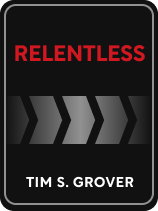

This article is an excerpt from the Shortform book guide to "Relentless" by Tim Grover. Shortform has the world's best summaries and analyses of books you should be reading.
Like this article? Sign up for a free trial here .
What is the meaning of relentless? What does it mean to not be relentless?
Being relentless is pushing yourself to be the best you can be without allowing anyone or anything to get in your way. On the flip side, being relentless doesn’t mean having raw talent, fame, or changing who you truly are to get what you want.
Below we’ll discuss the core values of relentlessness and the few criteria that don’t count towards having a relentless mindset.
What Relentlessness Is and Isn’t
In Relentless, author Tim Grover explains the qualities you’ll need to become the best in your field—qualities which he collectively calls “relentlessness.” He came up with these qualities by learning from his own personal training career, training, and getting to know some of the all-time great basketball players. Grover argues that by acting relentlessly, you can become an all-time great yourself no matter what your career, field, or discipline is.
What Relentlessness Is
Grover defines “relentlessness” as a state of mind in which you’re fully dedicated to becoming stronger, surviving, and overcoming obstacles to achieve your goals. The meaning of relentless, Grover asserts, is how you can become the best at what you do and succeed time and time again. He references his own experience training basketball legends like Michael Jordan or Kobe Bryant, highlighting them as examples of the kind of field dominance that relentlessness can lead to. However, Grover explains, relentlessness isn’t just for a select few elite athletes—it’s universal.
Relentlessness Is Universal
Grover explains that anyone can be relentless in pursuing any task or discipline—relationships, your job, an art form, and so on. This is because relentlessness isn’t about what you do, but about how you approach what you do.
In addition, he says that anyone can be relentless because relentlessness is natural and instinctual. All animals, even humans, are born with an instinctual drive to overcome obstacles and survive by any means necessary—in other words, we’re born with relentlessness and just need to learn how to access it.
How Much Does Evolution Inspire Behavior?
Grover’s argument here—that relentlessness is instinctual—is similar to that of “evolutionary psychology”: A framework that argues that human behavior is heavily influenced by instincts gained through evolution. However, scientists and scholars heavily debate the merits of evolutionary psychology. Its main critics tend toward two arguments:
- 1) Learning and changing: One of the main arguments made against evolutionary psychology comes from evidence that the brain physically changes in response to changes in environment or experiences. These changes would suggest that many behaviors are inspired more by what you learn, rather than what’s hardwired in you.
- 2) Testability: Another major criticism of evolutionary psychology is that it’s very difficult to test its main hypotheses. Even when researchers observe expected behaviors in studies, it’s difficult to definitively prove that instinct inspired them. Because of these difficulties, many critics argue that evolutionary psychology often relies on common sense principles or observations, rather than testing and research.
Note that Grover isn’t using this method of psychology to make his arguments—in fact, at one point he argues that science can’t ever explain relentless instincts. However, his ideas are similar enough to those used by evolutionary psychologists that these criticisms are still worth considering.
What Relentlessness Is Not
To help clarify his definition, Grover notes several criteria that you might mistake for the meaning of relentless and explains why they aren’t necessary to a relentless mindset.
Raw Talent or Skill
Being talented or skilled isn’t the same as having a relentless mindset. Just because you’re talented doesn’t mean you’ll use your talent to its full extent, or that you’ll constantly work to improve. On the other hand, if you lack natural talent, you can still act relentlessly by doing everything you can to overcome that lack.
(Shortform note: Given Grover’s argument here that talent isn’t enough for relentlessness (and the success it brings), you might wonder why people emphasize its importance. Angela Duckworth (Grit) explores two reasons why people overrate talent’s role in success. First, when you see others succeed, you only see the results of their hard work and therefore assume their success comes from natural skill. Second, many people overrate talent as a defense mechanism—assuming success comes from innate talent gives you an excuse for not succeeding: “I just wasn’t born talented.”)
Fame or Fortune
While you can earn fame and fortune with relentlessness, it shouldn’t be your end goal. Being relentless means caring about success itself, rather than what success might bring. There are plenty of rich and famous people who aren’t relentless, and plenty of relentless people who aren’t rich or famous.
For example, a businessman can be a millionaire from inheritance alone and never put effort into his work, while a teacher can relentlessly do everything possible to help his students succeed and have very little money or fame to show for it.
(Shortform note: Many rich and famous people share Grover’s belief that fame and fortune aren’t the cause of success. A survey found that a large majority of wealthy families worried that their money would reduce their children’s ambition instead of inspiring them to succeed.)
Change
When you learn what relentless means, you don’t change who you are. Grover repeatedly insists that nobody can change. Rather, he says, pursuing relentlessness means accessing the instinctual part of yourself that’s existed since birth. (Shortform note: Research contrasts with Grover’s point here, suggesting that personalities do change, whether it’s because of aging, a major life event, or a concerted effort. This suggests that adopting a new relentless mindset like Grover recommends would change who you are.)

———End of Preview———
Like what you just read? Read the rest of the world's best book summary and analysis of Tim Grover's "Relentless" at Shortform .
Here's what you'll find in our full Relentless summary :
- The qualities you’ll need to become the best in your field
- Why sacrifices and discomfort are necessary for growth
- Why you should practice indulging in your primal self






